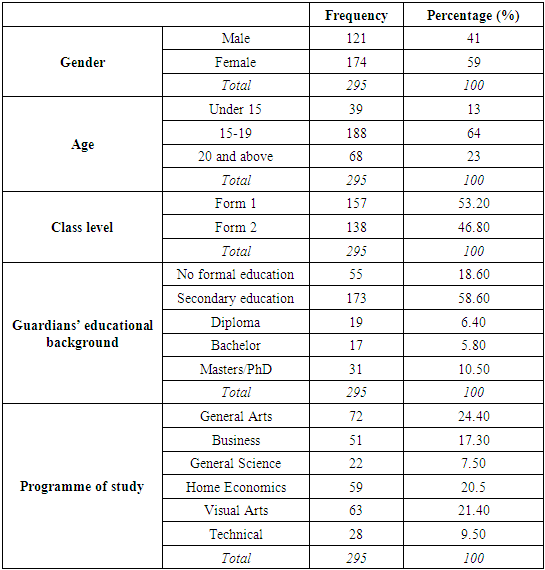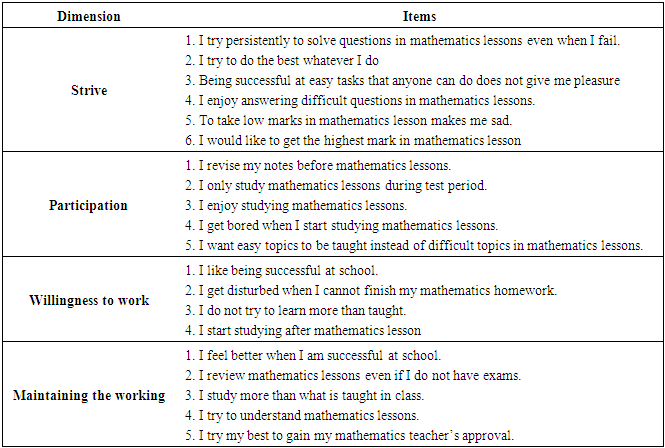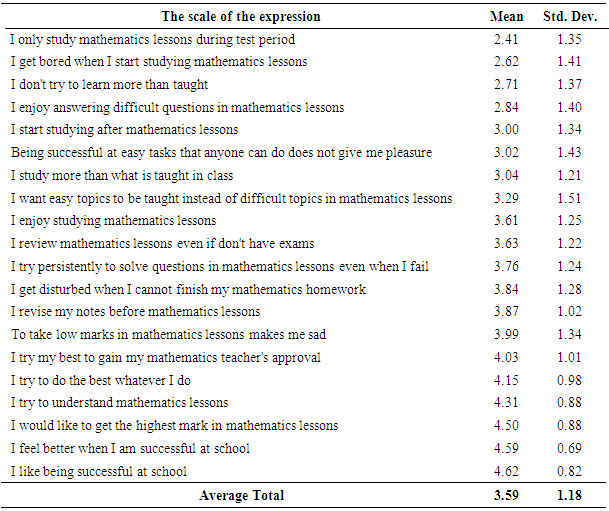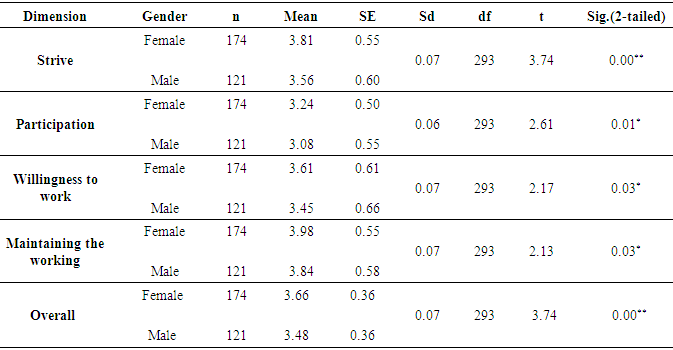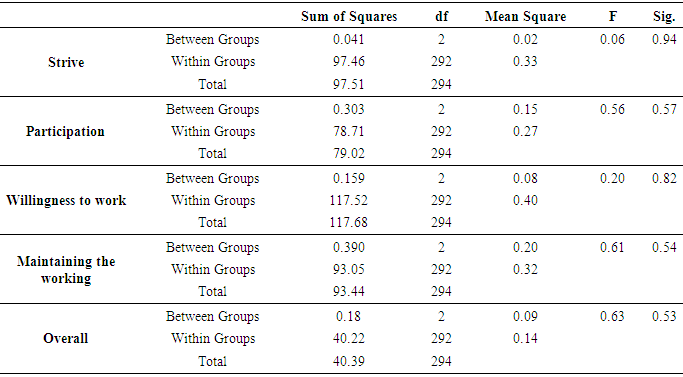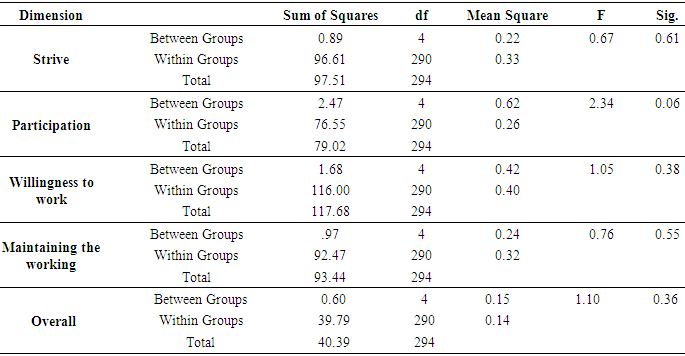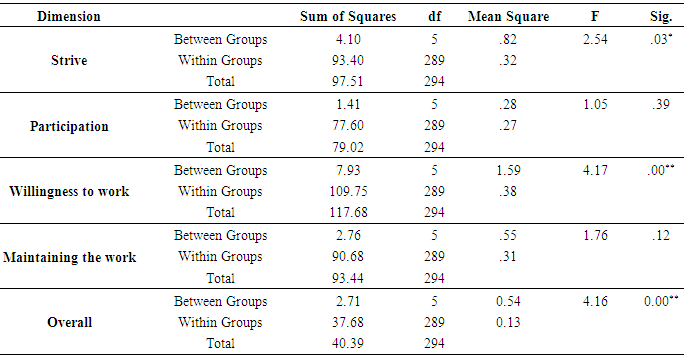-
Paper Information
- Paper Submission
-
Journal Information
- About This Journal
- Editorial Board
- Current Issue
- Archive
- Author Guidelines
- Contact Us
Education
p-ISSN: 2162-9463 e-ISSN: 2162-8467
2016; 6(4): 89-95
doi:10.5923/j.edu.20160604.01

Measuring and Relating Senior High School Students’ Achievement Motivation towards Mathematics Lessons
Afrifa-Yamoah E.1, 2, P. O. Cofie3, Bashiru I. I. Saeed4, Azumah Karim2, Adu Paul5
1Department of Mathematical Sciences, NTNU, Norway
2Graduate, Department of Mathematics, KNUST, Ghana
3Department of Mathematics Education, UEW, Ghana
4Department of Mathematics and Statistics, Kumasi Polytechnic, Ghana
5Mathematics Tutor, Adventist Girls’ Senior High School, Ghana
Correspondence to: Afrifa-Yamoah E., Department of Mathematical Sciences, NTNU, Norway.
| Email: |  |
Copyright © 2016 Scientific & Academic Publishing. All Rights Reserved.
This work is licensed under the Creative Commons Attribution International License (CC BY).
http://creativecommons.org/licenses/by/4.0/

Losing motivation to learn has serious consequences on students’ academic pursuance (Bridgeland, DiIulio, and Morison, 2006), but the concept of motivation has not been critically scrutinized to measure its effect in the study of Mathematics in Ghana. This study explored the senior high school students' achievement motivation towards Mathematics lessons in Ghana. The study aimed to investigate the level of achievement motivation of senior high students in Mathematics, and to establish the significance or otherwise of “gender”, “class level”, “age”, “guardians education”, and “programme of study” to students' achievement motivation. The survey design was employed for the study which involved 295 students. The Achievement Motive Scale (AMS) developed by Ellez (2004) was adapted in the design of a questionnaire for the study. The descriptive statistics, t-test and one-way analysis of variance (ANOVA) were used in the analyses. The analyses revealed that the level of students' achievement motivation towards Mathematics lesson is 3.59 out of 5, which is interpreted as a suitable level categorized as mid-high by the AMS adopted for the study. Also, gender, class level and programme of study were significant factors influencing students' achievement motivation level; however, age and guardians' educational background were not significant. Based on the findings, suggestions for increasing students’ achievement motivation towards Mathematics curriculum have been outlined.
Keywords: Mathematics lesson, Motivation, Achievement, Achievement motivation, Achievement Motive Scale
Cite this paper: Afrifa-Yamoah E., P. O. Cofie, Bashiru I. I. Saeed, Azumah Karim, Adu Paul, Measuring and Relating Senior High School Students’ Achievement Motivation towards Mathematics Lessons, Education, Vol. 6 No. 4, 2016, pp. 89-95. doi: 10.5923/j.edu.20160604.01.
Article Outline
1. Introduction
- The modern-day Ghana has placed greater emphasis on industrial and technological advancement. Development in almost all areas of life is based on effective knowledge of Science and Mathematics. There simply cannot be any meaningful development without knowledge of Science and Mathematics. It is for this reason that the education systems of countries that are concerned about their development put great deal of emphases on the study of Mathematics (MOE, 2010). As a result students’ are being encouraged to take up science related subjects and one subject that pierces all the sciences is Mathematics. Today, mathematical methods permeate evidently in every sphere of life and play a primary role in economic development of a country. In our quest towards scientific and technological advancement, we need nothing than good performance in Mathematics at all levels of education. Unfortunately performance of students in Mathematics at the end of Senior High School (SHS, hereafter) education has not improved in the past decade. (Chief Examiners’ Report, WAEC, Ghana, 2011). Mathematics is generally proclaimed to be the most fear generating subject in the school set of courses. Students’ asked to sum up their views of Mathematics at school described it in terms of one, if not all, of the three D’s - dull, difficult and dislike (Eshun, 2004). What is the level of senior high school students’ achievement motivation towards Mathematics lessons? This is a genuine question that must be answered to inform Mathematics educators and Curricula developers on the need to take advantage of the concepts of achievement motivation in educational policies, implementation and applications. The concept of students’ achievement motivation in relation to Mathematics in Ghanaian context has not been addressed literature. This study will establish senior high School students’ level of achievement motivation towards Mathematics lessons and further explore to ascertain the significance or otherwise of gender, class level, age, guardians’ education and programme of study of students to SHS students’ achievement motivation in Mathematics. There is the need to improve and extend understanding on the dynamics of factors affecting students’ achievement motivation towards Mathematics. The socio-constructivist perspectives on learning (Op’t Eydne, De Corte & Vershaffel, 2006) recognize the close relation between (meta) cognitive, motivational and affective factors in students’ learning and problem solving. They believed that students’ understanding and behaviour in the classroom is a function of the interaction between who they are (their identity), and the specific classroom context. In this regard, some socio-physical and economic characteristics among students must be well explored in relation to students’ achievement motivation. Terrel Bell, a Former Education Secretary of United States of America (1981-1985), is quoted in Usher, Kober, Jennings & Diane (2012) to have said that, “There are three things to remember about education. The first is motivation, the second one is motivation and the third one is motivation.” Although motivation is not as frequently discussed as other aspects of reform, it is a critical part of a student’s experience that can help quench the perceived phobia generated syndrome of Mathematics in our education system. Motivation can influence how students approach school in general, how they relate to teachers, how much time and effort they devote to their studies, how much support they look for when they are under pressure, how much they try to engage or disengage their fellow students in academic work, and how they perform on assessments (and therefore how the school performs). Losing motivation to learn has serious consequences on students’ academic pursuance. Bridgeland, Dilulio, and Morison (2006) in a survey exploring why students dropped out of high school, reported that, 70% of dropouts were unmotivated. If we place value on developing the achievement motivation of students, we are concerned with students’ initiating learning activities and maintaining an involvement in learning as well as a commitment to the process of learning.
2. Methodology
2.1. Data Collection and Sample Distribution
- The total sample included 295 SHS students recruited in Kwabre East district in 2013/14 academic year. The sample was formed through simple random selection scheme. The personal information of the respondents is shown in Table 1. Recruitment and consenting procedures were adhered to. Data were collected from an SHS student survey. The instrument consisted of paper and pencil questionnaire administered by the researchers. The questionnaire was segmented into two parts under the headings personal background and subject matter. There were 26 items in all; 6 items on the demographic background of students and 20 items adapted from Achievement Motive Scale (AMS) shown in Table 2. The students' achievement motivation is measured in the size of strive, participation, willingness to work and maintaining the working on a five scores likert scale. Items used to measure these four dimensions are presented in Table 2. The scale was developed to measure students’ achievement motivation levels as "most suitable (5)", "more suitable (4)", “suitable (3)", "not suitable (2)" and "not at all suitable (1) ". Demirel and Arslan Turan (2010) reported a reliability coefficient of 0.76 on the scale. Also, Aydin and Coskun (2011) employed this scale for their work and reported a Kaiser-Meyer-Olkin (KMO) coefficient of 0.81 and Cronbach alpha reliability coefficient of 0.70. In the current study, a Cronbach alpha reliability coefficient of 0.79 was obtained and according to the results obtained, the scale can be expressed as a reliable instrument.
|
|
2.2. Data Analysis Plan
- The wording of the response levels in the AMS adapted clearly implies symmetry of response level about a middle category; at the very least, such an item would fall between ordinal- and interval-level measurements; to treat it as merely ordinal would lose information. Also, responses to several likert items may be summed; provided that all items use the same likert scale and that the scale is defendable approximation to an interval, in which case they may be treated as interval data measuring a latent variable. Frequency counts, percentages and correlation analysis were used. The independent t-test technique was employed to ascertain whether or not the achievement motivation towards Mathematics lessons level of the SHS students who participated in the study differs according to the gender and class level. Also, Analysis of Variance (ANOVA) was employed to ascertain whether or not the students’ achievement motivation towards Mathematics lessons differ according age, programme of study, and educational background of guardian.
3. Results
- We present findings from determining the level of students’ achievement motivation towards Mathematics lesson and examining the significance or otherwise of the sex, age, class level, guardians’ educational level and programme of study to students’ achievement motivation towards Mathematics.The items measuring students’ strive towards Mathematics revealed that 73.5% of respondents try persistently to solve questions in Mathematics lessons even when they fail, 82.4% try to do the best in whatever they do, 44.4% do not get any pleasure when they are successful at easy tasks that everyone could do in class, 39% enjoy answering difficult questions in Mathematics lessons, 78.3% become very sad when they take low marks in Mathematics lessons and 92.2% would like to get the highest mark in Mathematics lessons. Most students agreed to the statement “I would like to get the highest mark in Mathematics lessons” and disagreed to the statement “I enjoy answering difficult questions in Mathematics lessons”. The results of the items measuring students’ participation towards Mathematics lessons revealed that 72.9% of respondents study hard to Mathematics lessons, 23.4% study Mathematics lessons during test period, 62.4% enjoy studying Mathematics lessons, 29.5% get bored when Mathematics lessons start and 52.8% want easy topics to be taught instead of difficult topics in Mathematics lessons. Most students agreed to the statement “I revise my notes before Mathematics lessons” and disagreed to the statement “I only study Mathematics lessons during test period”. It worth noting that more than half of the respondents wished that easy topics to be taught instead of difficult topics in Mathematics a finding supported in literature by Göç (2010), as in Aydin & Coşkun (2011) that, although pupils’ motivation level was high but they avoid to study difficult issues in Mathematics classes. The results of the items measuring students’ willingness to work towards Mathematics lessons revealed that 94.6% of respondents like being successful at school, 71.2% get disturbed when they cannot finish their homework, 33.2% don’t try to learn more than taught, and 40.7% start studying after Mathematics lessons start. Most students agreed to the statement “I like being successful at school” and disagreed to the statement “I don’t try to learn more than taught” likewise in Aydin & Coşkun (2011).The results of the items measuring students’ maintaining the work towards Mathematics lessons revealed that 94.6% of respondents feel better when they are successful at school, 64% review Mathematics lessons even if they do not have examination, 39% study more than the homework given them, 89.2% try to understand Mathematics lessons, and 77.3% try their best to gain their Mathematics teachers’ approval. Most students agreed to the statement “I feel better when I am successful at school” and disagreed to the statement “I study more than what is taught in class”.In determining the level of Achievement motivation towards Mathematics lessons, all the 20 items in Table 2 were used. The arithmetic mean and the standard deviation were employed to determine the level of students’ Achievement Motivation. The arithmetic average of the views of the students about the scale for the achievement motivation on mathematics lessons was 3.59. According to this, the views of the students about the Achievement Motive Scale (AMS) were determined to be at a “suitable” level. Among the answers given by students to the scale of achievement, the highest arithmetic average are: “I like being successful at school (4.62)”, “I feel better when I’m successful at school (4.59)”, “I would like to get the highest mark in mathematics lessons (4.50)”. This tells that most students assigned higher scores by agreeing or strongly agreeing with these items on the scale. It is important to note that these levels suggest that the students’ are highly optimistic and desire to do well in mathematics lessons. The views with the lowest arithmetic average include; “I only study mathematics during test period (2.41)”, “I get bored when I start studying mathematics lessons (2.62)”, “I don’t try to learn more than taught (2.71)”, “I enjoy answering difficult questions in mathematics lessons (2.84)”. This reveals that most students’ assigned lower scores by disagreeing or strongly disagreeing with these items on the scale. In studying the relation of some factors to students’ achievement motivation, the t-test was performed to determine the significance or otherwise of gender to students’ achievement motivation towards Mathematics. The result is as displayed in Table 4. The test revealed a significant effect of gender on students’ Achievement Motivation towards Mathematics lessons
 The study involved first and second year students in SHS. The t-test was performed to determine the significance or otherwise of class level on students’ achievement motivation towards Mathematics. From Table 5, the test revealed a significant effect of class level on students’ Achievement Motivation towards Mathematics lessons
The study involved first and second year students in SHS. The t-test was performed to determine the significance or otherwise of class level on students’ achievement motivation towards Mathematics. From Table 5, the test revealed a significant effect of class level on students’ Achievement Motivation towards Mathematics lessons 
 It is thus evident that students’ achievement motivation towards Mathematics is significantly influenced by class level.
It is thus evident that students’ achievement motivation towards Mathematics is significantly influenced by class level.
|
|
|
|
|
 It is thus evident that students’ achievement motivation towards Mathematics is significantly influenced by programme of study. A Tukey HSD multiple comparison test revealed that students’ offering General Science
It is thus evident that students’ achievement motivation towards Mathematics is significantly influenced by programme of study. A Tukey HSD multiple comparison test revealed that students’ offering General Science  Business
Business  Home Economics
Home Economics 
 Visual Arts
Visual Arts  and General Arts
and General Arts  had an “appropriate” level of Achievement Motivation which is more satisfactory compared to their counterparts offering Technical
had an “appropriate” level of Achievement Motivation which is more satisfactory compared to their counterparts offering Technical 

|
4. Conclusions
- In this study, Achievement Motivation was measured as functions of students’ strive, participation, willingness to work and maintaining the working. The views of the students about the scale for the Achievement Motivation on Mathematics lessons was 3.59, which is viewed to be at an “appropriate” level based on the scale. The study further explored the relation of age, gender, class level, programme of study and guardians’ educational background to students’ Achievement Motivation level and concluded that gender, class level and programme of study were significant factors in influencing students’ Achievement Motivation level; however, age and guardians’ educational background were not significant factors in influencing students’ Achievement Motivation level. Based on the findings of the study, the following recommendations are made. Mathematics teachers should encourage, by instilling confidence and the can do spirit in students’ in Mathematics lessons. A call for a national sensitization of the populace to do away with the stereotypic attitudes towards some SHS programmes of study. This is necessary because the various programmes of study prepare students for various professions needed for the development of the nation.
 Abstract
Abstract Reference
Reference Full-Text PDF
Full-Text PDF Full-text HTML
Full-text HTML